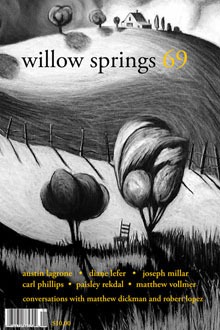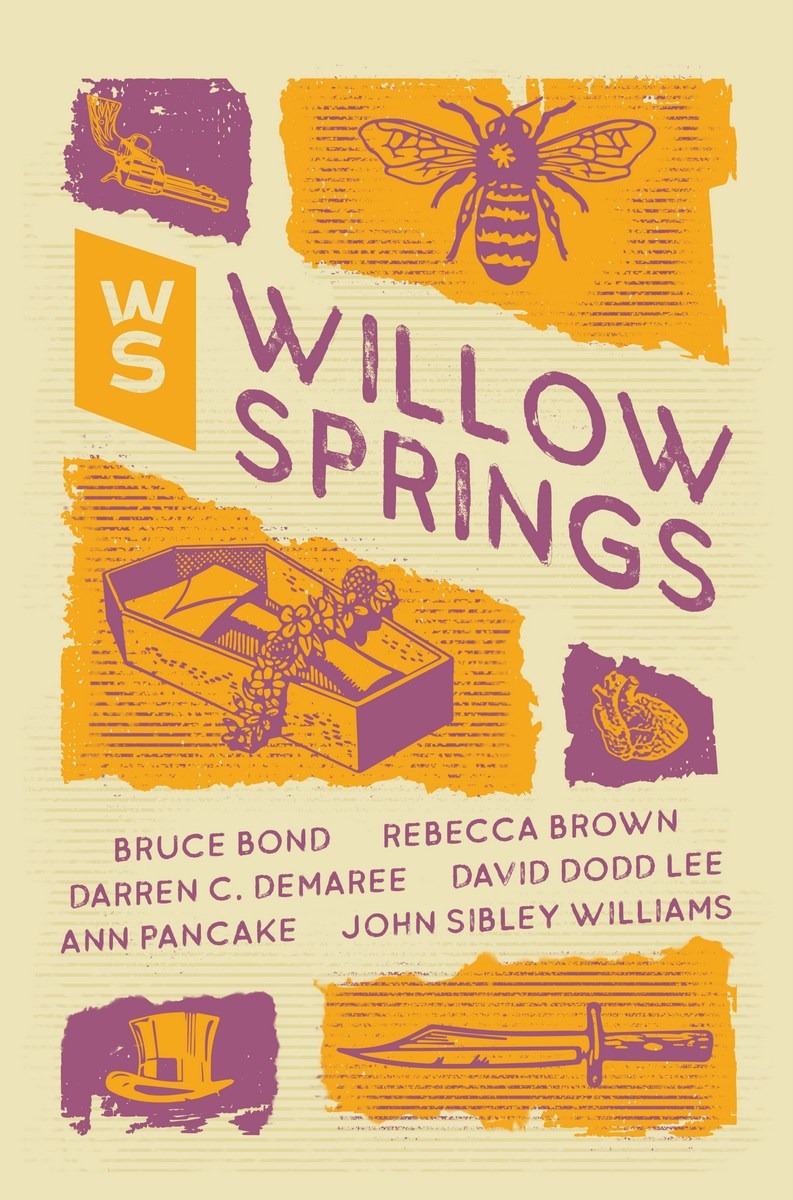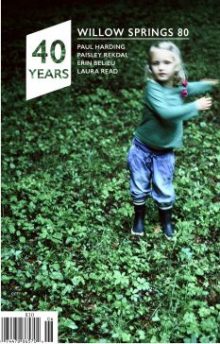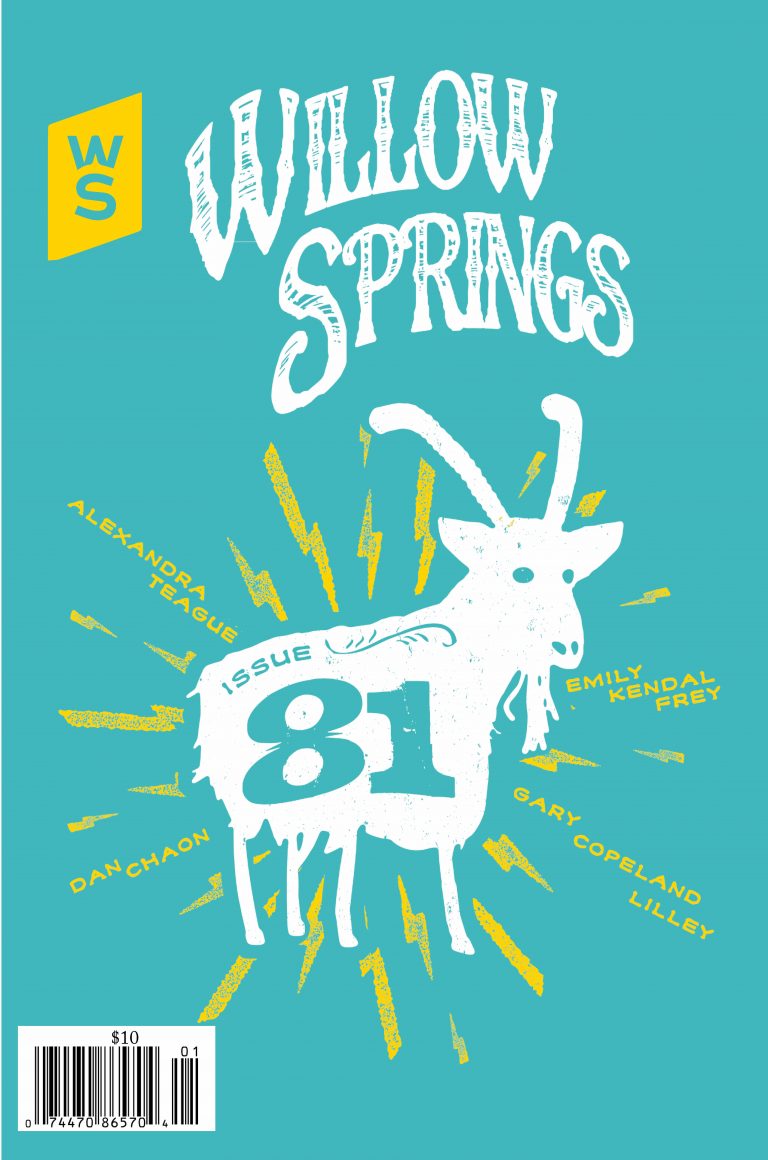PRESTON DASHED THROUGH THE GRASS toward the barn, which stood paper-gray in the fading light, the color of a hornet's nest. Barking echoed inside like rifle reports. "She ain't here," Uncle Eli said when Preston reached the door. "But don't worry. She'll slink home when the money runs out."
Preston's mom had been gone for six nights. One more would be an entire week, the longest he'd been without her. The night she left, she took Uncle Eli's cordless drill, his Skilsaw, and the 6,000-watt generator he used to power the barn. Uncle Eli was mad because he needed the generator for the show that night.
"I don't care," Preston said.
"That's good," Uncle Eli said. "Wouldn't change anything if you did."
Together, they crossed the meadow toward the truck parked in the driveway. The wind picked up, unruly in the open space, and lifted the tarp covering the front section of the house's roof. At night, Preston could hear the tarp snap in the wind, could feel the drafts reaching through the bedroom's cracked ceiling plaster. Uncle Eli planned to buy new shingles after the show. Or maybe he'd just pay someone to fix the roof-the payout would be good enough, he said.
Three coils of orange extension cord rested in the truck's bed. Uncle Eli told Preston to wait by the kitchen window. He took one of the coils inside, plugged it into the outlet by the sink, and threw the rest out the window.
They unraveled the cords over the grass. While he worked, Preston wondered how his mom had gotten away with the generator, the Skilsaw, and the cordless drill. He helped Uncle Eli move the generator-he knew how heavy it was. And where would she sell it? When ever she sold things, she took them to the junk store in Prescott, but the man there only ever bought things his mom could carry-jewelry, cameras, video games, DVDs.
They hadn't gone to the junk store since the day before Uncle Eli drove Preston's mom to the hospital. That morning, she'd sold the television. It wouldn't matter, she said, since he'd be staying with Grandma. After the junk store, they walked to Singer's trailer in Wheeler Court. The air inside smelled like matches and rotting fruit. His mom gave Singer the television money, and Singer handed over her medicine. Preston watched Singer move in slow motion on the couch while his mom took her medicine in the bathroom. Singer was sicker than his mom. His ribs showed beneath his skin.
"Let's go," Uncle Eli yelled across the meadow, and he vanished into the barn.
Preston paused before going inside, and bit the back of his hand. The pain lingered, took his mind away from his mom. She'd come back, like Uncle Eli said, when the money ran out.
Uncle Eli plugged in the string of construction lights tacked to the barn's rafters, flooding the dusty interior of the barn with light. The dogs bayed in their pens. The tow chains around their necks rattled as they lifted square jaws toward the ceiling to catch the scent of November.
Preston made his way along the chicken wire gates, saying the dogs' names aloud as he passed. Loose Cannon, Southpaw, Trigger, Sister Savage, Medusa, Pretty Nickel, and Saturday Night Special. He paused before Saturday's pen, and stuck his hand through the gap in the twisted wire. Saturday leaned his head against Preston's hand.
In July, a few days before his mom came home from the hospital, Preston had learned he couldn't trust the other dogs the way he trusted Saturday. Uncle Eli was gone, and while Grandma napped in her recliner, he'd snuck out to the barn with a box of frosted flakes. He slipped through a gap in the barn's sideboards. Pen to pen, he let the dogs lick the cereal from his hand. All of them were happy to see him, except Pretty Nickel, who limped across the dirt floor and sat heavily in front of the gate. A rotten smell hung on her coat. Pretty Nickel sniffed the cereal in his hand, but did not take it. And as she slung her knotted head toward the ground, something glistened on her snout. In the dusk of the barn, Preston could barely see the blood-matted fur around the wound. He reached out and touched it. Pretty Nickel snarled, and as Preston pulled away, she bit the back side of his forearm, and jerked her head until his flesh gave.
Now, Preston had a purple scar below his elbow. The skin had been torn in the shape of an L, like a shirt caught on a nail, leaving muscle exposed beneath the flap of skin. He didn't mind the scar when kids at school asked about it, he said it came from a wolf he'd fought in the woods- but Grandma screamed when she found Uncle Eli in the bathroom, stitching the wound closed with a sewing needle and a length of dental floss. "His mom's going to kill you," Grandma said. But his mom just cried when she came home from the hospital. She apologized for being gone and kissed the wound.
Uncle Eli pushed Preston aside and opened Saturday's pen. He slid the canvas muzzle over the dog's snout and jerked him by the collar toward the pit at the rear of the barn. Saturday didn't need a muzzle. At night, Preston snuck out and brought him treats. Some times, he sat behind Saturday in the dirt and pulled him close. He'd rub his muscles, tight since Uncle Eli had start ed Saturday's keep running him three hours a day on the treadmill, strapping him to forty-five pound weights and driving him across the meadow, making him leap and hang from the tires strung to the barn's rafters.
"Put some weight on him," Uncle Eli said.
Preston grabbed the dog's collar and straddled him the way Uncle Eli had taught him, one leg on either side of Saturday's ribs, pressure at the knees. Uncle Eli had been teaching Preston how to handle the dogs since Pretty Nickel bit him. Saturday's ribs expanded and collapsed between Preston's legs. He tipped his head back and sniffed the underside of Preston's jaw through the muzzle. Preston leaned forward and rubbed his nose on Saturday's head, quickly, before Uncle Eli turned.
Uncle Eli flicked the syringe between his fingers. Down on one knee, he slapped Saturday's shoulder. The dog tensed below Preston's weight and tugged against his collar when Uncle Eli slid the needle in.
"Saturday's ready for the show, isn't he?" Preston said.
Uncle Eli forced the plunger, and when the chamber was empty, pulled the needle out. "Saturday was born for the show," he said.
Preston rubbed the dog's muscles the way Uncle Eli had shown him.
"Everything's got a purpose," Uncle Eli said. "You figure out your purpose, you've figured out something important. That's your mom's problem--no purpose."
"What's my purpose?" Preston asked.
"To stand on your own two feet," Uncle Eli said.
Uncle Eli had already shown Preston how to do this. At the start of the school year, one of the 6th grade boys had pulled Preston's pants down at the bus stop. The boy and his friends laughed because Preston wasn't wearing underwear. That afternoon Preston came home crying. His mom hugged him, but Uncle Eli took him by the shoulder into the backyard. He turned Preston around and pushed him to the ground. "Get up," he said. And when Preston was standing, Uncle Eli pushed him again. "Quit crying and get up." Uncle Eli pushed him over and over until Preston got up on his own and punched Uncle Eli in the stomach. "Good," Uncle Eli said and patted Preston on the shoulder. "Don't let anyone push you around."
Uncle Eli pulled Saturday by the collar toward his pen. He unclipped the muzzle and shoved the dog inside with his boot. Saturday turned and sat, square chested in his pen. Saturday knew his purpose.
THE INSIDE OF GRANDMA'S HOUSE smelled like dog chow. Uncle Eli brewed the food in big saucepans, a blend of discount animal scraps, eggs, brown rice, carrots, fish oil, whey protein, and Red Cell Vitamin-Iron-Mineral supplement. Two saucepans stood on the range, the third on the wood stove with steam rising from the interior. The smell pawed at Preston's stomach. He poured himself a bowl of cereal and took a seat at the kitchen table.
In the living room, Grandma yelled at Uncle Eli. She was sick of hearing the dogs yapping in the barn, tired of people coming to her home to partake in sin.
"You want your roof fixed?" Uncle Eli said as he passed through the kitchen.
Preston's binder rested open on the table. He'd left it that way so anyone could see the stickers on the inside of the cover.
"Look," he said to Uncle Eli.
Mrs. Karas had given Preston the binder at the beginning of the school year, and told him to keep track of his homework. He'd lost it too many times. Now, each time he handed in his worksheet, she put a sticker inside the binder's front cover.
"I get a prize when I earn thirty," he said.
"That's good, pal," Uncle Eli said, opening the back door. "Work and you get paid."
"Can I come to the show?" Preston asked.
Uncle Eli had promised Preston he could come to the show when he was twelve years old, which was longer than Preston wanted to wait. Before closing the door, Uncle Eli said, "You're in charge of the house tonight. Stay inside and look after your grandma."
Preston took his homework and bowl of cereal into the living room. Grandma sat in her recliner, watching a man praise Jesus on the television.
His homework was about planets and stars and why everything moved through space the way it did. That afternoon in school, he'd tried to focus as Mrs. Karas stood at the front of class, pointing at a diagram of the solar system with a yardstick, but he couldn't stop thinking about his mom. Sometimes he imagined her at the front of class, wearing Mrs. Karas's dress, with Mrs. Karas's haircut and round glasses. Mrs. Karas had warm brown eyes. At school, he'd wanted to tell her that his mom was missing, but he was afraid of what she'd think.
"Grandma?" Preston said, leaning into the couch cushions. "Why does the earth move around the sun?"
She squinted at the television. Grandma saw things Preston couldn't see. Angels and miracles. Her prayers had power, she told Preston, because she was a true believer.
"Grandma?" Preston said again.
"What are you asking me?" Grandma said. "Why does the earth move around the sun?"
"Gravity," Grandma said. Preston leaned forward and wrote gravity in the blank. Grandma pointed at the television screen, as the preacher paced to the far side of the empty stage.
"Like God's love," Grandma said. "Holds everything together."
Preston looked back at his worksheet, but he didn't want to think about things he couldn't see. He didn't like to think about the earth spinning through empty space. He didn't like to think about God because God made things happen, even though you couldn't see Him.
"Uncle Eli says my mom has no purpose," Preston said.
"You keep asking God to show her mercy," Grandma said. “God’s love triumphs."
Grandma coughed into the crook of her arm, a cough like rocks colliding inside her chest. Preston pushed himself up and darted into the kitchen. He pulled a chair from the kitchen table to the sink. As he began filling a glass of water, a white Cadillac pulled into the driveway.
In the floodlight, Preston saw the blue and yellow Pennsylvania license plate. His heart rose for a moment. God's love triumphs. He ran the water to his grandma. She drank, and coughed some more into her hankie before tucking it back into the pouch on the recliner's arm.
The knock on the door rattled the windowpanes. Preston ran and pulled the door open. A man in a cowboy hat and leather boots stood in the porch light. His white T-shirt, tucked into blue jeans, was so clean it glowed against the dark. At his waist, the porch light splintered against the metal of a holstered pistol.
In the living room, the recliner's foot rest retracted and clicked into place. Preston heard Grandma grunt under her breath.
"No need to get up, ma'am." The man leaned inside and looked toward the living room. "I'm looking for Eli Dumphy."
"He's in the barn," Preston said. "I'll take you."
"Don't you leave this house," Grandma shouted as Preston closed the door and followed the man to his car. The inside smelled like cigarettes and air freshener, a blend that reminded Preston of the apartment in town where they lived before his mom went to the hospital. In the back seat, a dog sniffed at the gaps in the wire kennel. Preston pointed toward the barn. The Cadillac's engine growled when the man turned the key, and the frame bounced over divots in the meadow.
"What's your dog's name?" Preston asked. "She doesn't have one," the man said. "Why not?" Preston said.
The man glanced at Preston, dark-eyed beneath the brim of his hat. In the light from the dashboard his face looked knotted, like an old piece of hardwood.
Uncle Eli stood in front of the barn with a cigarette burning. The man parked, and the driver's side door tripped the dome light when the man opened it. Preston looked over the seat at the kennel. The dog inside licked her paws, her face and chest spangled with pale scars.
All of Uncle Eli's dogs had names.
The man opened the back door and leaned in. "Don't tempt her," he said.
Preston stepped out and stood beside Uncle Eli. The man's dog tugged at his arm as he led her toward the barn. She stopped to sniff at the meadow grass, but he wrenched her inside. Uncle Eli's dogs erupted in their pens.
"Where do you want her?" the man said.
"There's an empty pen in back," Uncle Eli shouted over the barking. After the dog was in her pen, Uncle Eli and the man counted money on the workbench in the rear of the barn. Two big stacks of bills and two bottles of beer rested on the surface. Uncle Eli kept his pistol beside the money, long and black with a wooden handle. The man kept his in the holster at his waist.
"Is that the money for the roof?" Preston said.
"Not if I can help it," the man in cowboy boots said. He laughed, patted Uncle Eli on the shoulder.
"Go on inside and finish your homework," Uncle Eli said.
Preston stomped his foot. He'd helped Uncle Eli with Saturday's keep, cleaned pens, hauled buckets of chow. Uncle Eli slid a five dollar bill from the bench and handed it to Preston.
"For helping out," Uncle Eli said. "Go on now."
WITHIN AN HOUR, eight more cars, five trucks, and four motor cycles had parked in the meadow. From the kitchen, Preston watched shadows pass through the dark to the barn's door. He rubbed the five dollar bill between his fingers. He knew better than to go back to the barn. Uncle Eli meant what he said.
Preston imagined Saturday pacing in his pen, getting ready. If Preston were there, he would whisper into Saturday's ear, tell him he could run faster and pull more weight than any dog. Tomorrow, he'd buy Saturday a treat with the money, a prize for his work.
In the living room, the footrest of Grandma's chair clicked into place. "Come help your grandma," she said.
Preston gripped her free hand with both of his, and leaned back with all his weight until she was upright. He handed over her cane and lifted the oxygen tank. She put her hand on his shoulder, distributing her weight between his shoulder and the cane. Up the stairs, she took shallow breaths and paused often. Preston paused with her, leaning against the rail to relieve the weight of the tank.
At the top of the stairs, Grandma sighed, then slid her hand along the wall the rest of the way to her bedroom. The walls were covered in faded floral paper. Above her bed hung a framed picture of Jesus staring toward some light. The bed creaked as she lowered herself, and Preston waited until she was settled to place her oxygen tank beside her. He pulled the blanket over her body.
"Pray with me," she said.
Preston took her hand. He wished he could crawl into the bed beside her, but her body left no room on the twin mattress. He closed his eyes, the way she'd taught him, and heard the breath rattle in her lungs. He didn't know what God looked like, or where God lived, so he imagined the earth swinging around the sun, tethered by God's love. Grandma thanked God for giving her another day to serve Him. She prayed for protection. The sin surrounding this house, she said, was more than she could handle. Have mercy upon her children for their sins, she prayed. And bless Preston with the wisdom to choose God's love. Amen.
"You leave your uncle alone tonight," Grandma said.
Preston said goodnight and took himself to the bathroom. Each night since his mom had come home from the hospital, she made him shower and brush his teeth before bed, and he'd done both each night since she'd been gone again. When she came home, he'd tell her that. He stepped onto the scale, and the dial spun to sixty-five pounds. Saturday weighed sixty-nine. Preston looked into the mirror. He flexed the muscles in his arms before getting into the shower.
In the bedroom, his mom's clothes were still in the duffel bag by the closet door. He buried his face in the fabric. Wherever she was, she didn't have any clean clothes. He pictured her in the woods, sleeping on a bed of leaves.
Downstairs, he flipped through the channels twice before turning the television off. He went to the window, pulled the curtain aside, and looked out at the slats of light shining through the breaks in the barn's rough-cut siding.
PRESTON WOKE ON THE COUCH, unsure of how long he'd slept. Something moved through the room. He lay still, held his breath. He could smell cigarettes and hairspray on the cold air moving through the front door. Moonlight spilled through the window, pooled on the carpeted floor. He rubbed his eyes and saw the shadow, leaned in behind the television. He could hear the fidgeting of fingers working the cords.
"Momma?" Preston said.
Her shadow uncoiled, and Preston turned the television on, saw his mom in the blue light with her arms wrapped around her torso.
"Sweet Jesus," she said. "You scared me."
Her eyes darted, lingered in the room's empty spaces before settling on Preston. She came toward him, in slow motion, hands out the way people in television churches reached toward the ceiling. Once she lowered herself onto the couch, he pulled his legs in against hers. He held her as she moved her fingers through his hair.
The burnt smell of her hands startled him. He wanted to call out to Grandma, but knew he might scare his mom away if he did.
"Are you home now?" Preston said. "Go back to sleep," she said.
Preston pushed himself up and grabbed his binder from the kitchen table. When he returned, his mom had her head in her hands. He opened the binder and slid it onto her lap. He pointed to the stickers. "How wonderful," his mom said. She closed the binder, grabbed the blanket from the back of Grandma's recliner, and spread it over him. She brushed his hair back from his forehead and kissed him with dry lips. Her fever was back.
"Do you know why the earth moves around the sun?" Preston said.
"I don't, baby," she said.
"Gravity," Preston said. "It's like when you have a purpose, or when you love something."
He'd gotten it wrong, he knew. He fumbled for the words, tried to say it again.
"It's not always so simple," his mom said.
She pulled the television's plug from the wall. With her arms hugging the wood-paneled sides, she struggled toward the kitchen door. Preston followed. When he reached the kitchen, he flipped on the light.
"Go back to sleep, Preston," she said through her teeth. She squinted and sighed. The weight of the television pulled her forward. "I'll be home in the morning."
Preston held out the five dollar bill Uncle Eli had given him. His mom paused, staring at the bill in his hand. Her lip trembled. "Put it in my pocket," she said.
From the porch, Preston watched the headlights of a car recede down the driveway. He was supposed to be in charge of the house, but he couldn't stop her from leaving. Uncle Eli would yell at him for letting her get away. The frost bit at his bare feet as he ran toward the barn. The snarling and baying of dogs met him before he reached the door. From the outside, the dogs sounded wild in a way he'd never heard. The door was locked, so he bolted to the gap in the back.
Inside, the air smelled of piss and metal, hissed with bright light. Men crowded the pit, leaned forward shouting, waving bottles, blowing smoke into the air. In the pens along the wall, the dogs paced, panted with tongues unfurled over teeth. They reared against the chicken wire.
On all fours, Preston edged around jean-clad legs and dirty work boots. When he reached the plywood wall of the pit, he pulled himself up. Inside, Uncle Eli stood with the man in the cowboy hat, both forward-bent and shouting. At their feet, the dogs thrashed. The air around them shivered. Preston felt burning in his fingernails, tasted dirt. He couldn't tell where one dog ended and the other began. Just a bloody mess of sinew and teeth, with a sound pouring out like chainsaws and sirens.
BEFORE THE SUN BROKE THE HILLS, the growl of motor cycle engines pulled Preston upright. He left the couch, and watched through the living room window as men staggered through the meadow, dropped into their cars, and drove away.
The man in the cowboy hat stepped from the barn, carrying his dog. Its head hung limp over his arm. He put it in the trunk of his car and slammed the lid. As the Cadillac rocked over the meadow, the barn's lights flickered and died. A moment later, Uncle Eli stepped into the moonlight, lit a cigarette, and started toward the house. Preston slipped back onto the couch and pulled the blanket over his head. When the front door scraped over the linoleum floor, he closed his eyes. Uncle Eli lurched through the room, whistling some tune Preston had heard before, but couldn't remember where. The smell of liquor and smoke followed Uncle Eli like a shadow. He paused in the center of the room. The whistling stopped. Preston peeked around the blanket. Uncle Eli's back was turned. A paper bag hung from his right hand, and his pistol was tucked into the waist of his pants. He was staring at the space where the television used to be.
When Uncle Eli closed his bedroom door, Preston crept through the kitchen. The cold rushed in when he eased open the door.
In the moonlight, the meadow was scarred by tire tracks.
He walked barefoot through the grass, wondering whether Saturday would be waiting for him, and found the barn door unlocked. The air inside felt thick, strange now with silence. He walked with his hands outstretched, feeling his way through the seamless dark. Eyes closed. Eyes open. It made no difference. He kept them shut, felt his way by the dampness of the dirt beneath his feet, by the breathing of sleeping dogs in their pens. He was careful not to wake them.
In front of Saturday's pen, he lowered himself to his knees, opened his eyes. He whispered the dog's name and saw nothing, so leaned in closer. He lifted his hand to the cage, but before his fingers reached the wire, warm breath brushed his fingertips. His hand snapped back. Before him, the darkness went on forever. There were things inside of it he could not see.
On the way back to the house, Preston edged along the crisscrossing tire tracks. The forest loomed on the far side of the meadow, empty as far back as the hills and farther. Morning light had smudged away a thin layer of night above the ridges, but overhead the stars were still bright. He paused, leaned back to stare into the sky. Nobody could see him here, nobody watched. He could feel it in his chest as he stood there, the force of the earth spinning away from the sun.









